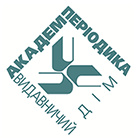STRATEGIC PRIORITIES OF THE ECONOMIC POLICY OF THE POST-WAR COUNTRIES OF THE BALKAN REGION
Section "Economics": Economic and Legal Problems of Sustainable Development
Abstract
The article highlights the peculiarities of the post-war reconstruction of the countries of the Balkan region, on the territory of which military operations took place. The analysis of losses and destructive consequences for the economy of Bosnia and Herzegovina, Croatia and Serbia, as well as trends of structural transformations in terms of sectoral division, was carried out. Based on the assessment of the differences in the structure of the economy of the developed countries of the European Union (EU) and the countries of the Western Balkans, conclusions are made regarding the possibilities of bringing the structure of the economy closer to European standards in the post-war and modern periods. The system of measures implemented by post-war countries in the field of attracting financial resources of international aid is characterized, and the analysis of the features of the use of sources of international financial support, the distribution of donor funds and grant support funds in the reconstruction of the economy of the Balkan countries is carried out. Based on the analysis of the economic development trends of the Western Balkan countries in 2016-2021, the priority areas of reforms that the countries under study need are determined. Attention is focused on the need to solve the problem of reducing the differences in the rates of economic growth of the Balkan countries, expanding economic integration within the macro-region and ensuring convergence with the EU member states. After analyzing the experience of the post-war reconstruction of the countries of the Balkan region, a number of institutional changes should be noted, which were aimed at the implementation of measures to bring them closer to the EU and increase the possibilities of attracting financial resources of international aid through program and grant support tools. A detailed analysis of diversified sources of international financial support was carried out, both in terms of the countries that participated in military operations, and in the Balkan region in general. Summing up, the analysis of the experience of the post-war recovery of the economy of a number of Balkan countries shows that its success is the result of a purposeful policy of structural reforms and consistent regulatory measures of the state to achieve the defined goals and priorities of economic recovery. It is noted that in the conditions of the war and after its end, Ukraine should take into account the experience of restoring post-war economies in order to speed up this process and avoid mistakes.
Keywords
economic policy, strategic priorities, macro region, post-war countries, structure of the economy, management quality, integration, convergence
Downloads
References
2. Bohdan T. Pisliavoienna vidbudova: uroky z dosvidu Balkan. BiznesTsenzor. 01.04.2022 [Богдан Т. Післявоєнна відбудова: уроки з досвіду Балкан. БізнесЦензор. 01.04.2022]. URL: https://biz.censor.net/m3330248 (дата звернення: 07.09.2023).
3. A fair exchange: AID to Yugoslavia for regional stability. ICG Balkans Report. 15 June 2001. No. 112. 31 p. URL: https://www.refworld.org/pdfid/3de639664.pdf (дата звернення: 07.09.2023).
4. Papadimitriou D. The EU’s strategy in the post-communist Balkans. Southeast European and Black Sea Studies. 2001. Vol. 1. Iss. 3. P. 69–94. https://doi.org/10.1080/14683850108454653
5. Mending Bosnia's post-war communities. Reliefwe. 02.04.2007. URL: https://reliefweb.int/report/bosnia-and-herzegovina/mending-bosnias-post-war-communities/ (дата звернення: 07.09.2023).
6. Economic and social revitalization and reintegration of Croatia’s war affected and disadvantaged areas. Reliefweb. 15.04.2011. URL: https://reliefweb.int/report/croatia/post-conflict-reconstruction (дата звернення: 07.09.2023).
7. Stošić1 I., Stefanović S., Vukotić-Cotič G. Privatization and restructuring of Serbian economy real and banking sector. In: Challenges of economic sciences in the 21st Century. Institute of Economic Sciences, Belgrade, 2008. P. 125-131. URL: http://ebooks.ien.bg.ac.rs/204/1/is_2008_01.pdf (дата звернення: 07.09.2023).
8. Data and statistics. URL: https://www.iea.org/data-and-statistics (дата звернення: 07.09.2023).
9. Western Balkans Regular Economic Report. Greening the Recovery. World Bank, 2021. No. 20. https://doi.org/10.1596/36402
10. World investment report 2020. International Production Beyond the Pandemic. Geneva: United Nations Publications, 2020. 268 p. URL: https://unctad.org/system/files/official-document/wir2020_en.pdf (дата звернення: 07.09.2023).
11. Uvalić M., Cvijanović V. Towards a Sustainable Economic Growth and Development in the Western Balkans. Friedrich Ebert Stiftung, Zagreb, 2018. URL: https://library.fes.de/pdf-files/bueros/kroatien/14688.pdf (дата звернення: 07.09.2023).
12. Eurostat. URL: https://ec.europa.eu/eurostat (дата звернення: 07.09.2023).
13. Petrakos G., Totev S. Economic structure and change in the Balkan region: implications for integration, transition and economic cooperation. International Journal of Urban and Regional Research. 2000. Vol. 24. Iss. 1. 2000. Р. 95-113. https://doi.org/10.1111/1468-2427.00237
14. World travel & tourism council (WTTC) represents the travel & tourism sector globally. URL: https://wttc.org/ (дата звернення: 07.09.2023).
15. Bouis R., Duval R. A Quantitative Assessment of the Potential Gains from Various Structural Reforms in the OECD Area and Beyond. OECD Economics Department Working Papers. 2011. No. 835. 35 p. https://doi.org/10.1787/5kgk9qj18s8n-en
16. Barnes S., Bouis R., Briad P., Dougherty S., Eris M. The GDP impact of reform. OECD Economics Department Working Papers. 2013. No. 834. 48 p. https://doi.org/10.1787/5kgk9qjnhkmt-en
17. Egert B., Gal P. The quantification of structural reforms in OECD countries: A new framework. OECD Economics Department Working Papers. 2016. No. 1354. 18 p. https://doi.org/10.1787/eco_studies-2016-5jg1lqspxtvk
18. Johansson A., Guillemette Y., Murtin F., Turner D., Nicoletti G., Maisonneuve C de la, Bagnoli P., Bousquet G., Spinelli F. Long-term growth scenarios. OECD Economics department working papers. 2013. No. 1000. 90 p. https://doi.org/10.1787/5k4ddxpr2fmr-en
19. Rovo N. Structural reforms to set the gowth ambition. Policy Research Working Paper. 2020. No. 9175. 42 p. URL: https://documents1.worldbank.org/curated/en/229781583758481770/pdf/Structural-Reforms-to-Set-the-Growth-Ambition.pdf (дата звернення: 07.09.2023).
Abstract views: 290 PDF Downloads: 214









